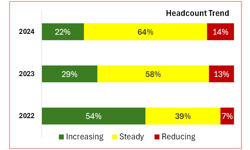At a first glance, Lord Carter’s Digital Britain White Paper didn’t appear to contain a great deal for the newspaper industry. His Lordship found that the much complained of competition rules, as applied to the industry, were robust and not in need of change. Apart from calling on the services of media regulator Ofcom to add some market impact intelligence to decision-making, that was more-or-less it.
Then there were the three pilot television news franchises – one for Wales, Scotland and England, probably in the North West, to be set up and run between now and 2012.
Newspapers can certainly take part in the pilots and Johnston Press and the Guardian Media Group are lined up to have a go.
But there have to be talks with the BBC before any of the money left over from the switch over to digital is used for that purpose and the Corporation is against such a thing even happening.
The BBC is even more adamantly opposed to top-slicing of the licence fee to pay for contestable local television news franchises after 2013. And anyway, Lord Carter couldn’t make up his mind on whether top-slicing of the licence fee was a good idea or not and has put the issue out to consultation.
Then there will be a general election within the next ten months, so very little could actually happen anyway…
Yet that is absolutely not how John Fry, who took over as chief executive of Johnston Press earlier this year, sees Digital Britain at all.
Buried within the report, he has found a few hidden gems that could be beneficial to the local and regional press.
Local authority publishing
“There are some good things. There is the suggestion that the Audit Commission should look at local authority publishing and review whether this is a wise thing to allow to happen,” says Fry, the former chief executive of Archant who succeeded Tim Bowdler at Johnston Press in January.
Local authorities getting into newspaper publishing has been an increasingly contentious issue in the industry. It was raised vociferously at the Local Media Summit in the House of Commons in April.
The Local Authorities Association tried to minimise the issue at the event but the Johnston chief executive points to extreme cases such as East End Life published weekly by Tower Hamlets council in London. It appears every week in full colour and is branded like an independent newspaper.
Fry believes journalists from the publication have even claimed to be from Trinity Mirror in order to get press passes.
“I think that it (Audit Commission involvement) is a good thing because local authority publishing started off with a very small magazine once a year and in some places has developed into a full-blown weekly newspaper which is pretending to be an independent commercial operation,” says Fry.
The Johnston executive fears that there is a clear “direction of travel” by local authorities towards more sophisticated and regular publication, which is leading not just to competition for advertising revenue but even competition for staff.
While public bodies have a duty to communicate with their consumers, Fry believes the use of public funds for what is often little more than a propaganda sheet for the ruling parties of particular local authorities raises serious issues about the use of public funds.
Freedom of Information requests sent to local authorities which publish newspapers have been unsatisfactory because the responses have failed to distinguish between the costs of producing such publications and more general marketing and communication costs.
While Fry sees the involvement of the Audit Commission in local authority publishing as good news, he is also surprisingly optimistic about the fact that no significant changes are planned to competition rules.
Competition rules
“We didn’t actually ask for changes to the system or to the laws. There is nothing actually wrong with the competition law. The issue is with the way the law has been applied to our sector and how markets are defined,” says Fry.
At a recent Parliamentary Committee meeting, the Johnston executive was able to emphasise how local newspapers now have to compete with everyone from eBay to Autotrader, both in print and online. In particular, it is difficult to quantify the competition from the internet because there is little comparative data.
“Ofcom has a lot of expertise on the media sector. I am optimistic that Ofcom will understand our industry better than the OFT (Office for Fair Trading),” says Fry.
The Johnston Press executive’s initial response to the proposed new regional television news franchises is also surprising.
“On the whole, I don’t think it is a great idea because it’s creating a second BBC. You already have the BBC, now we are going to have a second publicly funded entity,” argues Fry who says he comes at the media from a free market point of view.
Such an approach has served newspapers well in maintaining their independence from government.
“I think that once you become beholden to public bodies, there is a danger that your impartiality might be compromised,” argues Fry.
Despite his reservations, if such franchises exist, Fry will certainly push hard to take part and compete with the BBC in local television news and, hopefully open up a new stream of revenue.
Overall, Fry is optimistic about the impact of Digital Britain - not least because he believes that universal broadband will also be a good thing for British society and the economy.
But then you would need to be an optimist to move from the relative safety of the privately-owned Archant to the once mighty Johnston Press whose share price has been in meltdown.
Earlier this year, it became a penny stock with shares hitting an embarrassing low of 5p, though they have since slowly begun a modest recovery. Eighteen months ago, the stock was closer to 250p.
Why did Fry do it?
“I like a challenge. I think there is an opportunity at Johnston Press to get through a difficult period and then adapt the company to changed circumstances for the future,” he replies.
A challenge it certainly is but what does the impeccably qualified Fry with his INSEAD business degree, experience as a Bains consultant and as a former senior Dun & Bradstreet executive make of the prospects - or should that be plight – of the regional newspaper industry?
“We are obviously going through a period of structural change and I think the weaker newspapers in local markets will close, but I am optimistic that most markets will maintain a newspaper,” insists Fry.
The local and regional press has, after all, a penetration of 82%, bigger than both nationals and magazines.
“We have got very big audiences and I am therefore optimistic that we can continue to attract advertising to those audiences,” the Johnston executive believes.
By the end of last year, Fry estimates that the industry had lost about 20% of its revenues to structural, as opposed to cyclical, change.
When the economy picks up again, there will be some further structural change but nothing like the scale of the past three or four years.
“The severe issues of this year are more cyclical than structural - advertising declined by a third. The market is no longer dropping as it was. We are seeing more stability, now albeit it at a much lower level than it was,” says Fry.
The big problem remains jobs – hardly surprising given the fact that unemployment is still continuing to rise.
Debt financing
And what of Johnston Press, publishers of the Scotsman and the Yorkshire Post, now that the sale of its Irish titles has had to be abandoned because the price offered was considered unrealistically low? The failure to sell meant “a strong likelihood that the company will breach its financial covenants in the summer raising accountants qualifications over whether Johnston Press could survive as a going concern. You get such warnings in the accounts if debt has to be renegotiated.
Ideally Fry would have preferred to sell papers in Ireland such as the Leinster Leader series and the Derry Journal to reduce debt. But unless the price was good there was no point in selling.
“It’s a good asset and we are delighted to be keeping it. If we had to sell at a knockdown price, that would have been destructive of value. We always had a clear view of what sort of price was acceptable,” explains Fry.
Now debt has got to be reduced by other means and banking arrangements renegotiated.
In fact, the company’s level of debt has already come down, partly through raising new funds and partly through generating more cash as a result of cost cuts.
Discussions with the banks are continuing but, Fry insists, they are normal commercial negotiations rather than crisis talks.
“We see more stability and the good news – surprisingly - is that we are cash positive. Even after interests payments we are cash positive,” says Fry.
Such an achievement has meant that costs have had to be managed tightly to get through the recession and last year that led to the loss of 1,130 jobs. There are more redundancies to come this year but, Fry insists, not on the same scale as before, although he will not put a number on new job losses.
There are also uncertainties about ownership. Will minority shareholder, the Malaysian billionaire Ananda Krishnan, move to take over the company? Fry says simply that is a matter for him and shareholders are free to cut or increase their stakes. The billionaire is however an active shareholder with a representative on the board.
Right now, Fry is watching for the economic turnaround which could come sometime next year, though no one knows exactly when.
“As the cycle turns, we expect a little bit of lift in advertising which will benefit but we will also have to develop revenues around that core business of newspapers, be they digital or in other ways that leverage a local media business,” says John Fry.










